|
|
|
Sort Order |
|
|
|
Items / Page
|
|
|
|
|
|
|
| Srl | Item |
| 1 |
ID:
145116
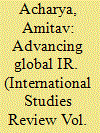

|
|
|
|
|
| Summary/Abstract |
This Presidential Issue, with contributions by scholars from Asia, Australia, the Middle East, South America, Africa, Europe, and the United States, illustrates how the idea of Global international relations (IR) could serve as a framework for both scholarly debate and empirical research and analysis. This issue is divided into two main parts. The first part contains nine feature articles that illustrate the multiple dimensions of a Global IR research agenda, overall demonstrating how bringing in non-Western ideas and agency broadens the horizons of existing IR knowledge. The topics covered here include Chinese conceptions of “relationality;” colonial interactions in the Indian Ocean to diffuse Westphalian sovereignty through processes of localization, comparing regionalisms, and norm dynamics in Asia and Europe; and the contribution of intercivilizational dialogues in bridging the West-Rest divide. Together, these articles challenge dominant understandings of these issues in current IR theory and highlight the place and agency of non-Western societies in the global order. The second part of the Presidential Issue, the Forum Section, contains ten short contributions that were drawn from two Presidential Theme Panels at the ISA 2015 Convention in New Orleans. These Forum essays not only highlight the obstacles facing the realization of Global IR, including some traditionalist objections to the whole idea, but also offer some pathways to overcome them. Overall, the Presidential Issue suggests that a Global IR is both possible and desirable.
|
|
|
|
|
|
|
|
|
|
|
|
|
|
|
|
| 2 |
ID:
089845
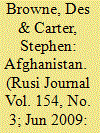

|
|
|
|
|
| Publication |
2009.
|
| Summary/Abstract |
The political questions in Afghanistan are difficult and complex. While the new US approach has much to be commended, there is still cause for alarm. Legitimacy and governance remain a massive challenge. Elections are a vital next step-but many doubt the credibility of the coming vote. Effective institution-building is threatened by an incoherent approach that does not grapple with the key issues, which are ultimately political.
|
|
|
|
|
|
|
|
|
|
|
|
|
|
|
|
| 3 |
ID:
088408
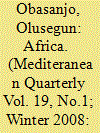

|
|
|
|
|
| Publication |
2009.
|
| Summary/Abstract |
This essay by Olusegun Obasanjo, former president of Nigeria, examines the challenges (AIDS, poverty, and governance) and opportunities (receptive investment climate, increasing democratization process, and a new framework for development) that African countries must deal with and the rest of the world respond to. The author asserts that Africa must engage the world community if it is interested in harnessing the full potential of its resources, as well as enjoying maximum output. The author argues that Africa is a friendly and profitable arena for investment and is moving away from corrupt and often mismanaged public sectors and toward good governance.
|
|
|
|
|
|
|
|
|
|
|
|
|
|
|
|
| 4 |
ID:
087423
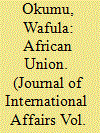

|
|
|
|
|
| Publication |
2009.
|
| Summary/Abstract |
As the African Union (AU) moves toward its tenth anniversary in 2012, it is drawing a great deal of attention to its handling of mounting crises that test its commitment. Across the continent, the AU is faced with crises that test its commitment and capability to fulfill the ambitious agenda it adopted at its formation in 2002.
|
|
|
|
|
|
|
|
|
|
|
|
|
|
|
|
| 5 |
ID:
137826
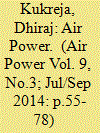

|
|
|
|
|
| Summary/Abstract |
From the end of the last century, it has been seen that the nature of war and armed conflict has been changing significantly, primarily due to two reasons, namely, the constantly evolving geo-political equations; and the unparalleled developments in technology, which were once considered to be a figment of the imagination. The world order today is changing at a rate that may be termed as illusory. The pace of the change may be comparable to the times that followed the defeat of Napoleon in 1815 and the defeat of Germany and Japan at the end of World War II in 1945. These changes, coupled with the advancements in technology, have significant implications on the nature of war, and, hence, national strategy, military strategy and force structure.
|
|
|
|
|
|
|
|
|
|
|
|
|
|
|
|
| 6 |
ID:
192912
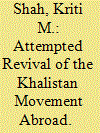

|
|
|
|
|
| Summary/Abstract |
The paper looks at the Khalistan movement, amidst the recent hunt
and arrest of radical preacher Amritpal Singh. It studies how the
movement has changed since the campaign for a sovereign Sikh state
went global in the 1970s; and what the demand for Khalistan entails
today. It studies the role the Sikh diaspora in the United Kingdom,
Canada, Australia and the United States has played; and how recent
events, particularly, protests at Indian High Commissions in these
countries reflects the ambivalence of India’s ‘allies’ towards the
separatists. The paper argues that while the nature of the threat posed
by Khalistani separatists is much milder today than it was decades
ago, the challenge for the Indian government will be the influence
of the Sikh diaspora on foreign politicians and New Delhi’s ability to
discredit the movement abroad.
|
|
|
|
|
|
|
|
|
|
|
|
|
|
|
|
| 7 |
ID:
087742
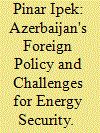

|
|
|
|
|
| Publication |
2009.
|
| Summary/Abstract |
This article examines Azerbaijan's foreign policy by demonstrating the interplay between the oil-led development process and early post-independence regional conflicts that enforced a Western orientation in the country's foreign policy. It is argued that geopolitics continue to prevail in the strategic goals of Azerbaijan. However, the new challenges in the emerging framework of energy security, which extends beyond the revitalized geopolitical rivalries and preeminent concern over securing energy supplies, put Azerbaijan's foreign policy at a crossroads and require a new trans-Atlantic partnership to promote human security and to manage the risk entailed in the unpredictable policy environments of the Caspian region.
|
|
|
|
|
|
|
|
|
|
|
|
|
|
|
|
| 8 |
ID:
142242
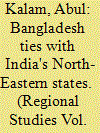

|
|
|
| 9 |
ID:
159611
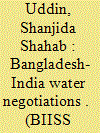

|
|
|
|
|
| Summary/Abstract |
Sharing river water between neighbours is a complicated task as it creates upstream-downstream supply disputes. Having the highest number of common rivers with its biggest neighbour – India, Bangladesh has to face common water sharing disputes with that country. To resolve disputes over water sharing, Bangladesh started negotiations with India after its independence, but the country has been facing challenges in reaching a consensus on a formula and mechanism to share the common water. Given this backdrop, the present paper argues that the water negotiations between Bangladesh and India are being affected due to significant negotiation challenges which make the water negotiations a zero-sum game. With this argument, the paper endeavours to examine the challenges of Bangladesh-India water negotiations. To understand these challenges, this paper evaluates historical fact, past and ongoing water negotiations between Bangladesh and India. Some possible solutions are also suggested in the paper to overcome these challenges.
|
|
|
|
|
|
|
|
|
|
|
|
|
|
|
|
| 10 |
ID:
150211
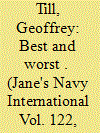

|
|
|
| 11 |
ID:
165643
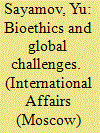

|
|
|
|
|
| Summary/Abstract |
THE UNITED NATIONS Educational, Scientific and Cultural Organization (UNESCO) pays special attention to bioethical issues when considering the social and ethical challenges facing humanity [6]. Bioethics, as an interdisciplinary field of knowledge at the intersection of philosophy, law, medicine, sociology, political science, demographics, and cultural and religious studies, addresses moral aspects of people's attitudes toward life and death. It comprises a wide range of socioeconomic, ethical and legal issues on the assumption that human values must not be considered separately from biological facts, and strives to develop moral and ethical norms, requirements and principles, establishing mechanisms for using scientific and technological achievements to benefit people and nature.
|
|
|
|
|
|
|
|
|
|
|
|
|
|
|
|
| 12 |
ID:
169232
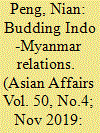

|
|
|
|
|
| Summary/Abstract |
There is a big gap on the study of Indo-Myanmar relations between India and China, in which the Indian experts are mainly concerned about the serious consequences of the China factor, while few Chinese scholars focus on Indo-Myanmar relations. This article, therefore, looks into the post-Cold War Indo-Myanmar relations from a Chinese perspective, so as to fill the research gap. It argues that India's influence upon Sino-Myanmar relations is actually marginal, though it has established a budding relationship with Myanmar through deepening political engagement, naval cooperation and physical connectivity with the country. The main reason is that India lacks full capability to develop the bilateral relations with Myanmar and thus compete fully with China. Additionally, the suspicion and resistance from the Burmese elite and local communities constitutes another major obstacle to the further engagement between India and Myanmar. Naypyidaw, notwithstanding its efforts to advance Indo-Myanmar relations, would prefer to gain benefits from both China and India.
|
|
|
|
|
|
|
|
|
|
|
|
|
|
|
|
| 13 |
ID:
087675
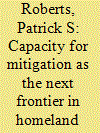

|
|
|
|
|
| Publication |
2009.
|
| Summary/Abstract |
Patrick S. Roberts examines the basic functions of homeland security, including defense against terrorist, natural, and industrial disasters. He concludes that the prevailing understanding of homeland security in theory and in practice undervalues the role of "mitigation," or reducing the damage when disasters occur.
|
|
|
|
|
|
|
|
|
|
|
|
|
|
|
|
| 14 |
ID:
142060
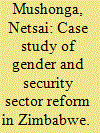

|
|
|
|
|
| Summary/Abstract |
This article explores gender and security sector reform (SSR) in Zimbabwe from 2008 to the present. It firstly postulates that the purpose of gender-sensitive SSR is to transform security services so as to enhance human security, as opposed to having an exclusive focus on state and territorial security. A comprehensive analysis of the policy and legislative framework governing gender and SSR at the global, continental, sub-regional and national levels will be presented, followed by the argument that efforts to reform the partisan and oftentimes non-professional tendencies of the security sector – especially the Zimbabwe Defence Forces, Zimbabwe Republic Police, Central Intelligence Organisation and Zimbabwe Prison Services – to promote democracy have met with firm resistance. However, gender-sensitive SSR has made significant headway in Zimbabwe since it is considered less threatening by the government. It should be noted, nevertheless, that gender-sensitive SSR has the potential to shift levels of professionalism and accountability within the sector as well as change attitudes to enhance security at the personal and communal levels. The process can gradually increase the percentage of women serving in the security sector. In conclusion, recommendations are made to broaden and deepen gender-sensitive SSR as the only viable alternative in the current political environment in Zimbabwe.
|
|
|
|
|
|
|
|
|
|
|
|
|
|
|
|
| 15 |
ID:
146942
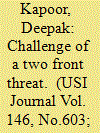

|
|
|
| 16 |
ID:
122136
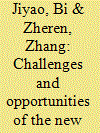

|
|
|
|
|
| Publication |
2013.
|
| Summary/Abstract |
The global economy has entered a new round of adjustment characterized by changes in the mode of growth, industrial setup, governance and monetary system. Such adjustment has brought about both rare opportunities and challenges that have to be properly addressed.
|
|
|
|
|
|
|
|
|
|
|
|
|
|
|
|
| 17 |
ID:
168236
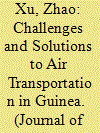

|
|
|
|
|
| Summary/Abstract |
After the dissolution of the first national airline in 2002, the Guinean government attempted to set up Guinea Airlines, but it was unsuccessful. This study aims to analyze the current state of air transport in Guinea and to conduct a diagnostic analysis for the revival of the national airline. The objective is to explore the causes of the failures of various attempts to revive the national company. The findings show that air transport has a positive spillover externality to economic long-run growth and the revival of Guinea Airlines could be a major asset to boost the country’s economic growth.
|
|
|
|
|
|
|
|
|
|
|
|
|
|
|
|
| 18 |
ID:
164139
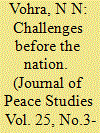

|
|
|
| 19 |
ID:
182477
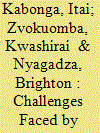

|
|
|
|
|
| Summary/Abstract |
The objective of the study was to capture the challenges that are faced by young informal traders in Bindura town, Zimbabwe. The study was motivated by the lack of attention to the challenges faced by young informal traders by the governing authorities at local and national level. We believe our study extends the understanding of the challenges faced by young informal traders, drawing on their everyday experiences and the navigation of the complex challenges they face. Deploying a qualitative research approach with in-depth interviews, focus group discussion and documentary analysis as data generation tools, the study found that young informal traders face several challenges that include lack of capital and harassment from municipal authorities as well as lack of mentoring and competition from established traders. Thus, the study established and concluded that within this difficult environment, young entrepreneurs employ different survival strategies such as raising capital from friends and relatives, relying on multifarious mentoring and coaching programmes from various sources. The paper recommends that government and private sector take up responsibility in nurturing these young entrepreneurs.
|
|
|
|
|
|
|
|
|
|
|
|
|
|
|
|
| 20 |
ID:
087969
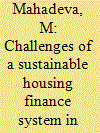

|
|
|
|
|
|
|
|